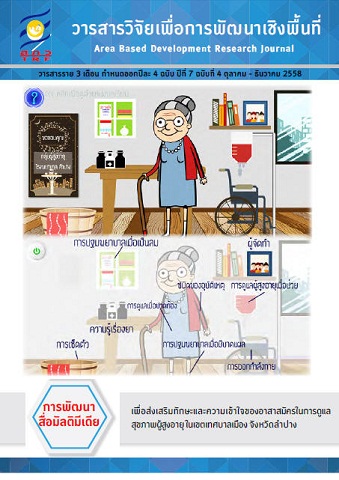การใช้ประโยชน์จากน้ำทิ้งโรงงานผลิต เส้นขนมจีนของชุมชนโพรงมะเดื่อ อำเภอเมือง จังหวัดนครปฐม ในการเพาะเลี้ยงสาหร่าย Spirulina sp.
Main Article Content
Abstract
บทคัดย่อไม่สมบูรณ์
The utilization of wastewater from fermented rice noodle factories in Prong Madua Community, Amphoe Mueang, Nakhon Pathom for Spirulina sp.
This experimental research aimed to investigate an appropriate utilization of rice noodle processing wastewater for Spirulina sp. cultivation and encourage the utilization of wastewater from rice noodle factories in Prong Madua Community. The research methods were 1) study the contexts of community and in the wisdom group of rice noodle innovative production in Prong Madua Community, Amphoe Mueang, Nakhon Pathom; 2) analyze wastewater quality and study wastewater quality suitable for Spirulina sp. cultivation in a laboratory; and 3) cultivate Spirulina sp. outdoor in wastewater from rice noodle factories in Prong Madua Community. The research period was from October 2013 to August 2014. According to the research result, it was found that 1) Khun Boonruen’s rice noodle factory was the biggest factory in Prong Madua Community and in the wisdom group of rice noodle innovative production. In this factory, there were about 20 employees in the factory; they were labors from the community. This factory produced fermented and non-fermented rice noodle for wholesaling at Klong Toei market. The production rate was approximately 3-4 tons per day with 800- 1,000 liters of wastewater in average. 2) As for the analysis of wastewater quality, processing wastewater quality was at the standard level with COD between 17,000 - 17,600 mg/L. When cultivating Spirulina sp. in wastewater medium diluted with distillated water at the dilution rate of 1:20 (volume by volume), Spirulina sp. could grow best at 1.8x107 cell/ml. 3) Regarding the outdoor cultivation of Spirulina sp., the level of COD was decreased at 87% from 638 to 81.33 mg/L. The results can be concluded that rice noodle processing wastewater has potential for cultivating Spirulina sp. and it would be the guideline for utilizing community waste for developing the potentiality and economy of the community.
Article Details
Area Based Development Research Journal values copyright protection and licensing to safeguard author rights and facilitate the appropriate dissemination of research. Our policies ensure openness, accessibility, and attribution. Authors retain copyright ownership, and articles are published under a Creative Commons Attribution License (CC BY), allowing sharing, adaptation, and proper attribution. Authors have the freedom to publish under the CC BY license, granting broad reuse and distribution permissions. The journal supports posting articles on third-party repositories, adhering to institutional and funding restrictions. Author guidelines detail copyright and licensing requirements, empowering authors with knowledge about their rights and responsibilities. These policies cultivate an environment of collaboration, openness, and responsible sharing, benefiting authors and the research community while honoring intellectual property rights.


